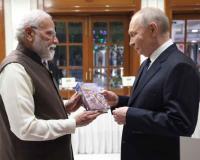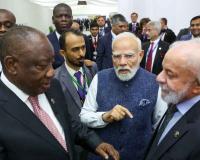Prime Minister Modi Highlights Sardar Patel’s Vision for a Unified India on National Unity Day

Ekta Nagar (Gujarat), October 31. Prime Minister Narendra Modi said on Friday that Sardar Vallabhbhai Patel wanted to integrate the entire region of Jammu and Kashmir into India just like other princely states, but the then Prime Minister Jawaharlal Nehru did not allow it to happen.
As per agency report, addressing the gathering near the Statue of Unity in Ekta Nagar during the National Unity Day parade, Modi said that infiltration was disturbing India’s demographic balance and that a decisive battle had been launched against it. He added that Sardar Patel believed in making history through hard work rather than spending time writing it. After India’s independence, Patel successfully integrated more than 550 princely states into the Indian Union, a feat once considered impossible.
The Prime Minister said that the policies and decisions of Sardar Patel created new history, and for him, the idea of “Ek Bharat, Shreshtha Bharat” (One India, Great India) was of utmost importance. Targeting the Congress party, Modi said that India had to pay a heavy price for the mistakes committed by the party on the Kashmir issue.
He stated that Patel had wanted complete integration of Jammu and Kashmir into India, but Nehru did not allow his wish to be fulfilled. As a result, Kashmir was partitioned and given a separate constitution and flag, a blunder that cost the nation dearly for decades. Modi remarked that while Sardar Patel valued national sovereignty above all, the governments that followed failed to uphold it with the same seriousness.
Referring to national challenges, Modi said that the mistakes made in Kashmir, the unrest in the Northeast, and the spread of Naxal-Maoist movements were all serious threats to the nation’s sovereignty. He accused previous governments of abandoning Patel’s firm policies and adopting a weak and indecisive approach. He further alleged that due to Congress’s soft stance, a part of Kashmir fell under Pakistan’s illegal occupation, which later fueled state-sponsored terrorism.
Highlighting the government’s actions, Modi said that by revoking Article 370, Kashmir had been fully integrated into the national mainstream. He asserted that both Pakistan and terrorist groups now understood India’s true strength. Referring to Operation Sindoor, he said the world had witnessed India’s resolve to eliminate any threat by striking at its source, declaring, “This is Sardar Patel’s India.”
Speaking on the government’s campaign against Naxalism, Modi stated that the fight would continue until the menace was eradicated completely. Before 2014, around 125 districts were affected by Maoist violence, which has now been reduced to 11, with only three districts still under its influence.
He warned that illegal immigrants pose a serious threat to India’s unity and internal security, alleging that they were encroaching upon national resources and disrupting demographic balance. He accused previous governments of ignoring this issue for vote-bank politics but asserted that India had now decided to take decisive action against infiltrators. Modi emphasized that the nation must reaffirm its resolve on National Unity Day to ensure that every illegal migrant is expelled from the country.
Criticizing the Congress party further, Modi said it inherited a “colonial mindset” from British rulers and accused it of fostering political untouchability in India. He questioned how Congress governments treated leaders like Sardar Patel, Babasaheb Ambedkar, Netaji Subhas Chandra Bose, Dr. Ram Manohar Lohia, and Jayaprakash Narayan, alleging that they were sidelined or disrespected both during and after their lifetimes.
The Prime Minister also claimed that Congress had even altered portions of the national song “Vande Mataram” on religious grounds, calling it a divisive act that advanced the British agenda and laid the foundation for India’s partition.
Amid ongoing language debates in some states, Modi clarified that every Indian language is a national language and that no language should ever be imposed upon others. He said that India’s hundreds of languages and dialects reflect the country’s inclusive and creative spirit, making it one of the most linguistically rich nations in the world. He expressed pride that India has Tamil, one of the world’s oldest languages, and Sanskrit, the language of knowledge. Modi reiterated that the government wants every child to progress in their mother tongue.
Before his address, the Prime Minister inspected the National Unity Day parade, which featured contingents from police and paramilitary forces marching near the Statue of Unity.




